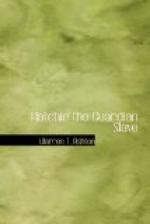“It is your father’s will, ma’am,” replied Uncle Nathan, disdaining all preface and preliminary to this important remark.
“My father’s will, sir! Impossible!”
“Fact, ma’am. I will tell you all about it,” and Uncle Nathan proceeded, in his own blunt way, to relate his adventures in the hold.
Emily listened with surprise and joy to the honest farmer’s story. When he had concluded, although she did not give way to the joy of her heart, a change from the depth of despair to the pinnacle of happiness took place in her silent heart. How devoutly she thanked the great Father who had watched over her in her anguish, and now shed a halo of joy across her darkened path! How earnest was the silent prayer which arose from the depths of her heart, for the safety of the faithful slave, who had perilled his life for her happiness! How deeply laden with the incense of gratitude was the song of thanksgiving which rose from her soul to the Giver of all good!
And when Uncle Nathan told the story of the duel, a new song of thanksgiving arose for Henry’s safety. The joy she felt in his preservation would not be entirely confined to her heart, and Uncle Nathan—unromantic bachelor as he was—could not but discern the deep interest she felt in him.
The interview was concluded, and the worthy farmer left the gallery more rejoiced than if he had himself been declared heir of Colonel Dumont’s millions; and he looked around, as excited as a school-boy on the first day of vacation, to find Henry, and relate the good news.
CHAPTER XIII.
“Louder than the
loud ocean, like a crash
Of echoing thunder.”
BYRON.
The day of the duel was a day of happiness to Emily Dumont. The restraint which Jaspar’s presence imposed was removed. Maxwell, from prudence or some other motive, did not intrude upon her. Her heart was rejoiced by the glad tidings which Uncle Nathan had conveyed to her. Henry Carroll was permitted to enjoy her society. It was a day of bliss to both; and, though a crowded steamer could ill afford the privacy which new-born love ever seeks, yet opportunities of giving expression to their feelings were not wanting. All day long they revelled in the delightful emotions which warmed their hearts. Their intercourse was now burdened by no painful reflections on the misery which had so lately environed Emily. The means of her restoration to home and society were at hand. The only difficulty now was to discover the best method of establishing her rights. Against Jaspar and Maxwell they cherished no ill-will,—they had no desire to punish them for their wicked designs.
Uncle Nathan, too, was in the “full enjoyment of his mind.” The relief he had “providentially” been able to afford to Emily’s mind was the medium of an abundant satisfaction. As the darkness began to gather, he found an opportunity of conversing with Henry, whose entire devotion to Emily during the day had rendered him a stranger in the gentlemen’s cabin. The plot which Hatchie had revealed to him had caused him but little anxiety. Maxwell’s wounded arm, he concluded, would delay its execution. But he gave the particulars to Henry, who was not at all satisfied that it would not be undertaken.




